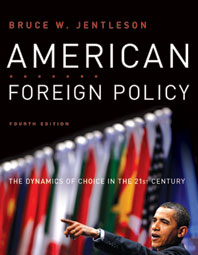|
|
Course Description
This
course focuses on American foreign policy. Foreign policy can be defined
as the means by which a nation-state relates to other nation-states. In
other words, foreign policy constitutes the ways in which a country promotes its
interests in the world. A country is able to do this by a variety of
methods: forming alliances, establishing trade relationships, negotiating
treaties, shoring up domestic support for international policies, bargaining
with international organizations, crafting military doctrines, and waging war.
It is important to
study U.S. foreign policy for at least two reasons.
First, we have a vested interest in it since we all live here.
Second, since the end of the Cold War, the U.S. has become the most
powerful country in the world. This gives the United States a wider array
of policy options, and policy concerns, than any other country in the world.
In this course we
attempt to answer the following questions: What is foreign policy? How
does it differ from domestic policy? Why should we study American foreign
policy? Should American foreign policy be based on the spreading of American
democracy and capitalistic ideals? If not, what should be the driving motivation
in America’s relations with other nations?
Some
additional topics for our consideration are: The "war" on terrorism, U.S. military strategy and issues
in the post-cold war world,
Controversies, such as rendition, Guantanamo prison, enemy
combatant in American foreign policy in relation to international law and
organizations,
Foreign policy and the media, and
the
Bush Doctrine.
Required
Reading:

American
Foreign Policy, Bruce Jentleson, 4nd edition, W.W.Norton, 2010. This
book has a student website
http://www.wwnorton.com/college/polisci/forpol3/
also check out:
http://www.wwnorton.com/college/polisci/american-foreign-policy4/ch/01/studyplan.aspx
Exams:
Three exams will be given. All tests are essay tests. An exam will be
given after completion of each major section of the readings.
Grades:
Grades are based on three in-class essay exams (together 60% of the
grade), and four written exercises (30%), and class participation
(10%). The participation component comes from in-class discussions and
participation in the listserv discussions.
Office Hours and email addresses:
Office Location: Room 206, McNamara Hall
Hours: Monday 11:00 to 12:00
Wednesday 11:00 to 12:00
Friday 11:00 to 12:00
Other times by appointment
You can also reach me by using email either at Lewis or at home.
At Lewis send to: gazianjo@lewisu.edu
At home send to: gazianoj@comcast.net
|
|


